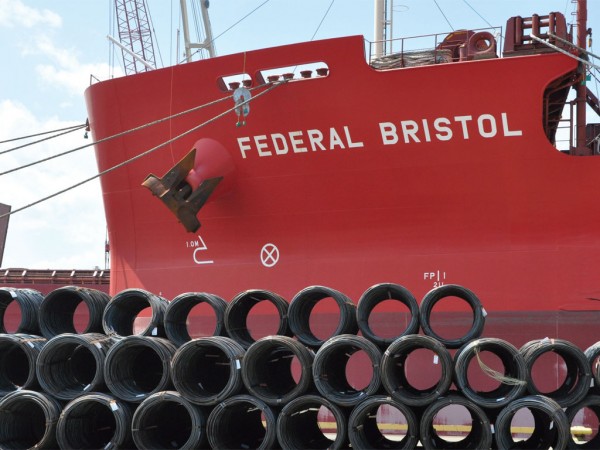During an interview with AJOT, Michel Tosini, executive vice-president of Federal Marine Terminals (FMT) appeared to be trying to catch his breath, and it was not from doing something arduous like running up stairs! No, he was just sparing a few moments like someone navigating through a hectic business schedule.
“Things are going gangbusters, it’s as simple as that,” said Tosini, who oversees the extensive network of 12 FMT facilities in the Great Lakes, the US East Coast and the Gulf of Mexico. Exceptionally robust steel demand (accompanied by high prices), despite the Trump Administration tariffs on imported metals from Canada and the European Union, has been a major contributing factor.
“As far as 2019 is concerned,” Tosini indicated, “we would be happy to maintain our 2018 tonnage. Looking back, there has been an abnormal growth of volume this year – higher than expected.”

A subsidiary of Montreal-based Fednav Limited, FMT has for over 50 years been operating stevedoring facilities at ports in the United States and Canada, serving the needs of customers in handling breakbulk, bulk, containerized and general cargoes. The wide range of commodities handled includes steel, cement, cocoa, containers, gypsum. machinery, sugar, wood pulp, forest products and various agricultural products.
FMT terminals are located at Albany, Burns Harbor, Cleveland, Eastport, Hamilton, Lake Charles, Milwaukee, Port Manatee, Tampa and Thorold (Ontario).
Hamilton, which is Canada’s leading Great Lakes port and home to the country’s largest steel complex, is a major center of activity for FMT.
“At Hamilton,” Tosini said, “we are on track to run 10% above 2017. It’s notably steel coils and slabs (chiefly from Europe) plus a good chunk of bulk cargo, mostly salt, alloys and fertilizers.”
Robust Steel Demand
Regarding the Trump 25% tariffs on imported steel, Tosini said “some cargo may be on hold in Canada, but the overall impact seems to have been minimal. Frankly, it’s overseas cargo that has been affected to some limited extent. But steel production in the U.S. has not been able to keep up with demand, so they don’t have a choice but to import.”
In fact, Tosini suggested the 2018 steel demand environment came as somewhat of a surprise. “We were expecting a steel decrease that has not happened. The demand was still there and somebody is paying.”
Steel, general cargo and project cargo are all showing similar volume this year to 2017 for FMT at the U.S. Great Lakes ports of Cleveland, Milwaukee and Burns Harbor.
At Port Manatee, Tosini said there has been strength in forest products, aluminum and containers from Mexico to U.S. markets.

Bagged Rice from Lake Charles to Iraq
And at Lake Charles, Louisiana, there has been a nice surprise in agricultural products.
“We have seen a sudden surge of agricultural products, mostly bagged rice, going to Iraq,” Tosini disclosed. “There are a lot of rice producers in southwest Louisiana. Between now and the end of January, we estimate there will be about 120,000 tons of bagged rice going to Iraq from Lake Charles.”





